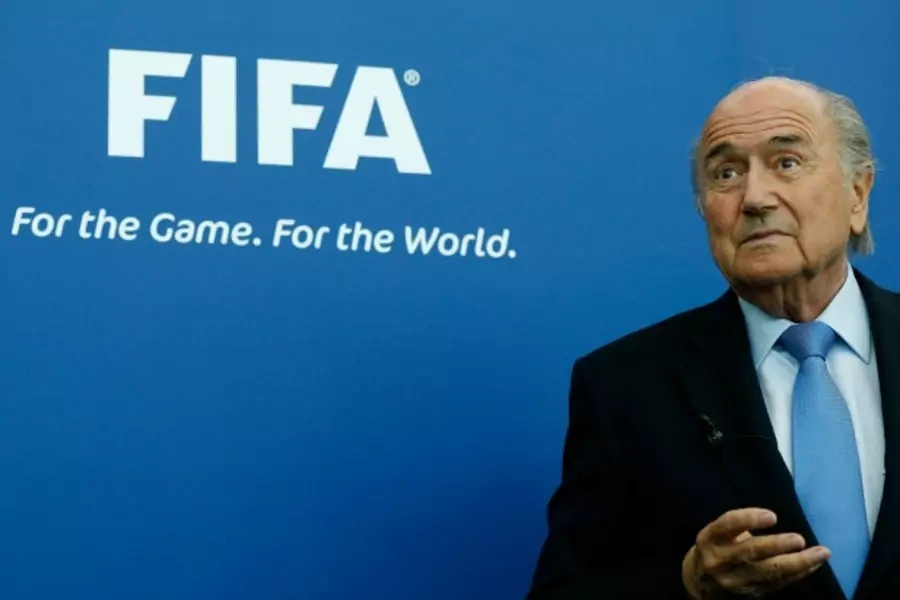This Week in Markets and Democracy: FIFA Corruption, Chronic Hunger, and Poverty Reduction

More on:
This post marks the launch of a new feature on the Development Channel, "This Week in Markets and Democracy." Each Friday, CFR’s Civil Society, Markets, and Democracy Program, will highlight the week’s noteworthy events and articles.
1. Rampant Corruption at FIFA
On Wednesday, Swiss police raided a Zurich hotel and arrested several top officials of the global soccer governing body FIFA with plans to extradite them to the United States. The U.S. Department of Justice is charging them, along with former FIFA officials and top sports marketing executives, with corruption, money laundering, conspiracy, and racketeering. “These individuals and organizations engaged in bribery to decide who would televise games, where the games would be held, and who would run the organization overseeing organized soccer worldwide,” said U.S. Attorney General Loretta E. Lynch. The Department of Justice estimates that officials received$150 million in bribes and kickbacks since the early 1990s. FIFA has long been mired in inconclusive corruption scandals. Now the United States and the Swiss government—which is investigating bribery allegations in Russia and Qatar’s bids for the 2018 and 2022 World Cups—are unveiling the rampant, systematic corruption plaguing the international organization. The arrests have received overwhelming support from the global soccer fandom. Even senior soccer officials have expressed support. In a statement, the European soccer federation (UEFA) said, “These events show, once again, that corruption is deeply rooted in FIFA’s culture. There is a need for the whole of FIFA to be ‘rebooted’ and for a real reform to be carried out.” These investigations not only offer an opportunity to clean up soccer’s international governing body, but they are also a boon for anti-corruption organizations and activists—illustrating how domestic laws and courts can help change even the most opaque and powerful international organizations.
2. FAO 2015 Report shows chronic hunger reaches record lows
This week, the Food and Agriculture Organization of the United Nations (FAO) released its annual hunger report, which monitors global food deprivation and security. According to FAO estimates, chronic hunger worldwide fell below 800 million for the first time since FAO began tracking it. The FAO also reports that the majority of the 129 monitored countries achieved the 2015 Millennium Development Goal of halving domestic undernourishment. Developing regions, however, missed the MDG target, though narrowly (by less than one percentage point). FAO Director General José Graziano da Silva optimistically stated, “The near-achievement of the MDG hunger targets shows us that we can indeed eliminate the scourge of hunger in our lifetime. We must be the Zero Hunger generation. That goal should be mainstreamed into all policy interventions and at the heart of the new sustainable development agenda to be established this year."
These gains are particularly impressive given they occurred in the face of economic recessions, volatile commodity and food prices, extreme weather and natural disasters, and political instability—all of which aggravate food insecurity.
Yet, progress has been uneven across world regions. Over the past few decades, East and Southeast Asia as well as Latin America and the Caribbean significantly reduced hunger within their borders. Sub-Saharan Africa and South Asia, on the other hand, lag behind, and the two regions are now home to over half of the chronically hungry. Breaking with the global trend, the undernourished population in Sub-Saharan Africa actually increased by 25 percent since 1990-92. For these laggards, the FAO calls for inclusive economic growth, agricultural investments, and expanded social protection as the ways to reduce hunger.
3. It’s possible to lift people out of poverty
Poverty eradication is the first goal of the sustainable development framework, the proposed successor of the Millennium Development Goals. World leaders have committed to ending extreme poverty by 2030. The problem donors, multilaterals, nonprofits, and private sector partners confront is that poverty is a complex, multidimensional issue—which encompasses lack of access to health, education, financial services, capital, and markets. Programs often suffer from shoddy implementation, prove difficult to replicate across countries, achieve results in one aspect of individuals’ lives but not the others, or fail to deliver benefits that last.
Against this backdrop, a new study published in the May 2015 issue of Science offers if not a panacea, certainly hope. Authored by several development economists, including MIT’s Abhijit Banerjee and Esther Duflo and Yale’s Dean Karlan, the paper presents findings from six randomized control trials (RCTs) implemented in Ethiopia, Ghana, Honduras, India, Pakistan, and Peru. In five of the six countries, it finds that multipronged poverty reduction programs—which they call graduation programs—can deliver sustainable benefits. By providing a productive asset, training, access to savings, health care, regular home visits, and food or cash for a few months to a year, they find that household income and consumption not only increased during the intervention, but continued after. This suggests that a concentrated approach can raise people out of poverty in the long term, good news indeed.
More on:
 Online Store
Online Store